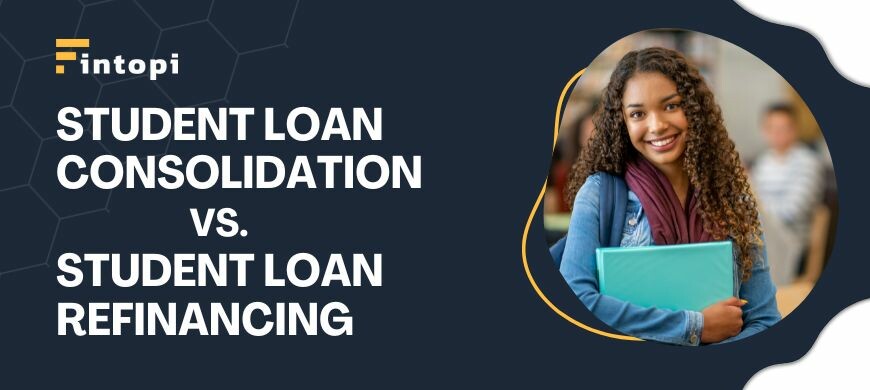Consolidation vs. Refinancing Student Loans: Make the Right Choice
If you’re one of the approximately 45 million Americans with student loan debt, you may have heard the terms “consolidation” or “refinancing” thrown around. You’re in the right place if you need clarification on what these terms mean or how they differ.
Consolidation and refinancing are two methods to manage your student loans more effectively. While both options can simplify your monthly payments and lower your interest rate, critical differences could impact which option is best for your situation.
Weighing Pros & Cons of Refinancing vs. Consolidating Student Loans
Federal Loan Consolidation:
A Direct Consolidation Loan is a loan offered through the U.S. Department of Education that allows you to combine multiple federal education loans into a single federal loan. Only federal student loans can be consolidated through a Direct Consolidation Loan.
Pros:
– Simplifies repayment by combining multiple loans into one payment
– May extend repayment term up to 30 years
– Retains access to federal protections and benefits (e.g., income-driven repayment plans, Public Service Loan Forgiveness)
Cons:
– Does not reduce interest rates; instead, it averages existing rates
– Extending repayment term may increase the total amount paid over time
Student Loan Refinancing:
Student loan refinancing is when you take out a new private student loan to pay off your current student loans (both federal and private). This process involves applying for a new loan with better terms from a private lender.
Pros:
– Potentially lowers interest rate based on creditworthiness
– Combines multiple loans into one payment
– Customizable repayment terms depending on the lender
Cons:
– Loses access to federal protections and benefits
– Requires good credit or a cosigner with good credit
– Not all borrowers will qualify for lower interest rates
Deciding Between Refinancing Student loans and Loan Consolidation? Let’s Help!
When deciding between consolidation and refinancing, consider your financial goals, current loan types, and eligibility for federal benefits.
If you have only federal student loans and want to retain access to income-driven repayment plans or Public Service Loan Forgiveness (PSLF), consolidating through a Direct Consolidation Loan may be the best option. One-time cancellation can only be applied to your existing Direct Loans if they were disbursed on or before June 30, 2022, and to consolidation loans comprised of any FFEL or Perkins loans if you applied for consolidation before September 29, 2022.
However, if you have federal and private student loans or are confident in your ability to repay without needing federal protections like forbearance options or PSLF, refinancing could save you money by lowering your interest rate. Remember that if you refinance your federal loans into a private loan, you’ll lose access to all federal protections and benefits.
To consolidate or refinance your student loans – What to choose? Explore with us at FINTOPI!
Ultimately, deciding between consolidating vs. refinancing student loans depends on individual circumstances. Here are some questions that might help guide your choice:
- Do I need access to income-driven repayment plans?
- Am I pursuing Public Service Loan Forgiveness?
- Based on my credit score, can I qualify for better terms through refinancing?
Answering these questions honestly while considering the pros & cons of each option mentioned above should lead to making an informed decision about which path is right for effectively managing one’s student debt.
Consolidate Vs. Refine-Which is best for you?
In conclusion, consolidation and refinancing can simplify your student loan repayment process by combining multiple loans into one payment. However, the critical difference lies in whether or not you want to retain access to federal protections and benefits.
If maintaining these benefits is essential, consider consolidating through a Direct Consolidation Loan. If saving money on interest rates and customizing your repayment terms are more appealing, refinancing with a private lender is the better choice.
FAQ
Can I consolidate my private student loans?
No, only federal student loans can be consolidated through a Direct Consolidation Loan offered by the U.S. Department of Education.
What happens if I refinance my federal student loans?
Refinancing federal student loans means converting them into a new private loan, thus losing access to all federal protections & benefits such as income-driven repayment plans or Public Service Loan Forgiveness (PSLF).
How does credit score affect refinancing options?
A higher credit score increases the chances of qualifying for lower interest rates when applying for refinancing from private lenders. In contrast, consolidation only requires good credit since it's done through the government program directly without involving third-party financial institutions like banks or other lending companies providing the funds needed during this process.



